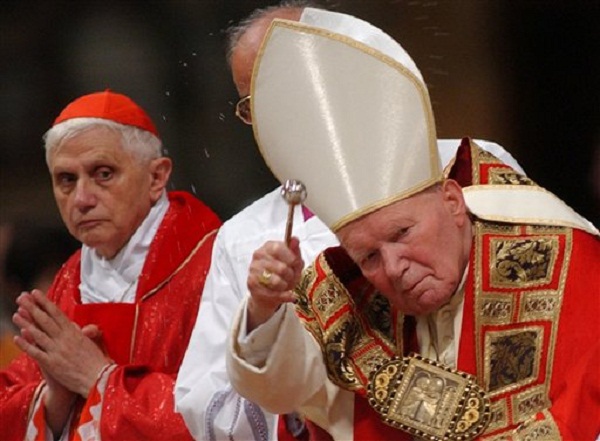The pope and his predecessor: a study in contrasts

In this file photo taken Sept. 11, 2002, then Cardinal Joseph Ratzinger of Germany, left, now Pope Benedict XVI, looks on as late Pope John Paul II celebrates Mass in St. Peter’s Basilica at the Vatican. Pope Benedict XVI has spent much of his eight-year papacy in the shadow of his larger-than-life predecessor, only to burst into the limelight with his shock resignation announcement on Monday, Feb. 11, 2013. AP/PIER PAOLO CITO
VATICAN CITY—Pope Benedict XVI has spent much of his eight-year papacy in the shadow of his larger-than-life predecessor John Paul II, only to burst into the limelight with his shock resignation announcement on Monday.
But the stark contrasts between the Polish pope—a former stage actor who loved human contact—and the shy and media-averse Benedict belie an identical view of the world.
Their conservative positions matured over the more than two decades when Benedict, then Cardinal Joseph Ratzinger, was the head of the Vatican body that enforces Catholic Church doctrine.
Both grew up under totalitarian regimes, whether Nazi or Stalinist, and both constantly warned darkly against a return to “barbarism” when man looks no further than himself—and not to God—to determine his destiny.
Several of John Paul II’s encyclicals directly reflected the thinking of his cerebral Bavarian aide.
One of the best known, titled “Faith and Reason,” expounded on their shared positions on the family and homosexuality.
The two were also on the same page on a range of life issues including abortion, contraception and euthanasia.
Both worked for rapprochement with Jews, spoke of Europe’s “Christian roots,” sought dialogue with agnostics, and demanded a place for religion in the modern public arena.
While both supported this over-reaching message of the Second Vatican Council in the 1960s, they also called the faithful out on what they saw as taking the reforms too far.
Here the convergence between the two holy men ends.
Benedict, by deciding to step down rather than live out his papacy come what may, set himself radically apart from his predecessor.
And while the pope delivered the announcement with his characteristic reserve, it was a historic bombshell in the Catholic world and beyond.
John Paul II chose to soldier on as Parkinson’s disease ravaged him further with each passing week, turning his visible personal suffering into a way of sharing that of millions of others—a metaphor for bearing the cross.
But many, even within the Church, took a dim view of such a prolonged and public agony, feeling it dwelt too heavily on pain as an expression of faith.
It was also a period during which a rudderless Vatican was unable to manage the start of the predator priest crisis that has dogged it ever since.
Vatican experts say Benedict XVI wants to avoid such a scenario, and that his decision is also in line with his more pragmatic temperament, his sense that the head of the Catholic Church should be in full possession of his faculties in “today’s world, subject to so many rapid changes,” as the pontiff put it on Monday.
Benedict, since the start of his papacy, has also distinguished himself from his predecessor by seeking to diminish his stature, deferring to “God alone” as the main actor in Catholic life.
Indeed, he said on accepting the papacy that he would be a “simple servant in the Lord’s vineyard.”
According to his brother Georg and others close to the pontiff, he was not impressed by the enormous power he wielded, feeling most at home with his intellectual pursuits, notably writing a trilogy about Jesus.
Just three days before he announced his resignation, the pope told an audience of seminarians: “It is mistaken triumphalism to say that God chose me because I am great.”














